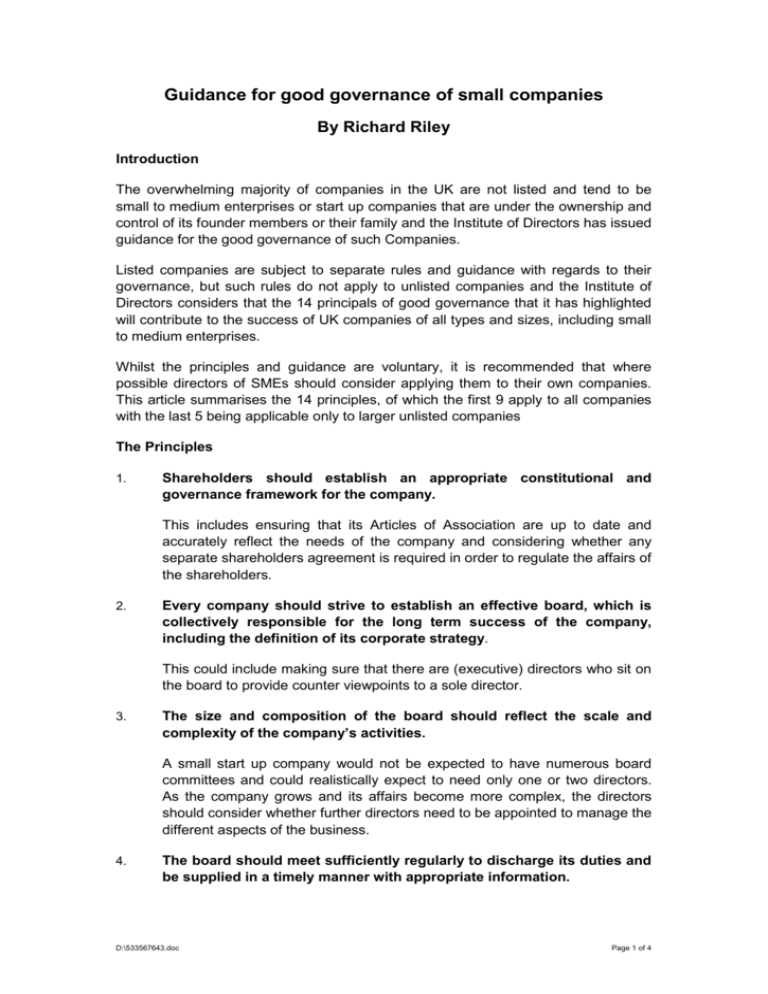guidance for good governance of companies
advertisement

Guidance for good governance of small companies By Richard Riley Introduction The overwhelming majority of companies in the UK are not listed and tend to be small to medium enterprises or start up companies that are under the ownership and control of its founder members or their family and the Institute of Directors has issued guidance for the good governance of such Companies. Listed companies are subject to separate rules and guidance with regards to their governance, but such rules do not apply to unlisted companies and the Institute of Directors considers that the 14 principals of good governance that it has highlighted will contribute to the success of UK companies of all types and sizes, including small to medium enterprises. Whilst the principles and guidance are voluntary, it is recommended that where possible directors of SMEs should consider applying them to their own companies. This article summarises the 14 principles, of which the first 9 apply to all companies with the last 5 being applicable only to larger unlisted companies The Principles 1. Shareholders should establish an appropriate constitutional and governance framework for the company. This includes ensuring that its Articles of Association are up to date and accurately reflect the needs of the company and considering whether any separate shareholders agreement is required in order to regulate the affairs of the shareholders. 2. Every company should strive to establish an effective board, which is collectively responsible for the long term success of the company, including the definition of its corporate strategy. This could include making sure that there are (executive) directors who sit on the board to provide counter viewpoints to a sole director. 3. The size and composition of the board should reflect the scale and complexity of the company’s activities. A small start up company would not be expected to have numerous board committees and could realistically expect to need only one or two directors. As the company grows and its affairs become more complex, the directors should consider whether further directors need to be appointed to manage the different aspects of the business. 4. The board should meet sufficiently regularly to discharge its duties and be supplied in a timely manner with appropriate information. D:\533567643.doc Page 1 of 4 Whilst the regularity of the meetings required for a particular company will vary depending on a number of factors (including its size, business activities and complexity of the transactions it is involved in) the directors should give consideration to how often they consider they need to meet. 5. Levels of remuneration should be sufficient to attract, retain and motivate executives and non-executives of the quality required to run the company successfully. Providing a salary to a director that is commensurate with their level of experience and expertise will help to retain them and ensure that they keep their skill set within the company and thus help to promote its success. 6. The board is responsible for risk oversight and should maintain a sound system of internal control to safeguard shareholder investment and the company’s assets. This principle reflects the position that the board of directors are responsible for the day to day running of the company and have a duty to the company to ensure that they only act in its best interests. The directors should make sure that they have a way of monitoring themselves and their business to ensure that they do not take unnecessary risks which may be detrimental to the company’s success. 7. There should be a dialogue between the board and the shareholders based on a mutual understanding of objectives. The board as a whole has responsibility for ensuring that a satisfactory dialogue with shareholders takes place. The board should not forget that all shareholders have to be treated equally. As set out above, the directors are responsible for day to day running of the company and the beneficiaries of the successful company will be the shareholders. It is therefore the directors responsibility to make sure that they are in regular contact with their shareholders in order to ensure that all of the shareholders (and not just the vocal majority) are satisfied with their performance and to obtain feedback as to how the company should move forward. 8. All directors should receive induction on joining the board and should regularly update and refresh their skills and knowledge. This can include providing the directors with details of their duties and responsibilities under the Companies Act 2006 and other forms of business and management training, 9. Family controlled companies should establish family governance mechanisms that promote co-ordination and mutual understanding amongst family members, as well as organise the relationship between family governance and corporate governance. D:\533567643.doc Page 2 of 4 Similar to principle 1, companies should ensure that they have appropriate articles of association and (if necessary) shareholders agreements - the simple fact that the shareholders of a company may all be related to one another does not negate this requirement. Indeed, there is an argument to say that family dynamics being what they are formally documenting the relationships and the way that the company is governed is especially important in family controlled companies. 10. There should be a clear division in responsibilities at the head of the company between the running of the board and the running of the company’s business. No one individual should have unfettered powers of decision. In larger companies it will be impossible for one director to manage every aspect of a company’s business and on that basis different directors should be given different responsibilities within the company. 11. All boards should contain directors with a sufficient mix of competencies and experiences. No single person (or small group of individuals) should dominate the board’s decision making. This is intended to ensure that the company has a broad knowledge and experience base to draw upon when making decisions. 12. The board should establish appropriate board committees in order to allow the more effective discharge of its duties As companies grow larger the board cannot be excepted to have knowledge of and/or manage every single aspect of the business and on that basis committees or sub-committees should be established in order to allow groups of directors to focus on certain aspects in greater detail. 13. The board should undertake a periodic appraisal of its own performance and that of each individual director. An objective appraisal of performance will minimise the risk of complacency creeping in and highlight any areas where the board or an individual director may be deficient. 14. The board should present a balanced and understandable assessment of the company’s position and prospects for external stakeholders, and establish a suitable programme of stakeholder engagements. A stakeholder is any person who has an interest or stake in the company and is affected by the company’s actions. This can include employees, the local community and the environment. There is a movement towards companies focusing not purely on the interests of their shareholders as they did in the past but instead considering how their actions may impact on stakeholders and this principle places a requirement on companies to give consideration to this. D:\533567643.doc Page 3 of 4 Conclusion The ability of any company to comply with the principles and the extent to which they can do so will vary from company to company and it may be the case that certain principles are more applicable to certain companies. However, as a way of guidance towards good corporate governance, the principles are to be welcomed and directors should (so far as they can) give consideration to the principles and look to follow them in order to promote the success of the company. It is likely that potential external investors such as private equity firms will view compliance with the principles as a positive aspect of a company when determining whether to provide investment to it. Whilst most external investors will seek to impose (to a greater or lesser extent) their own governance requirements, a company that has sought to comply with the principles will be more adaptable to these and therefore a more attractive investment prospect. If the above principles highlight any issues within your business, or if you wish to discuss directors’ responsibilities further, please call us on 0161 969 3131 and ask to speak to a solicitor in our Corporate Department. D:\533567643.doc Page 4 of 4








